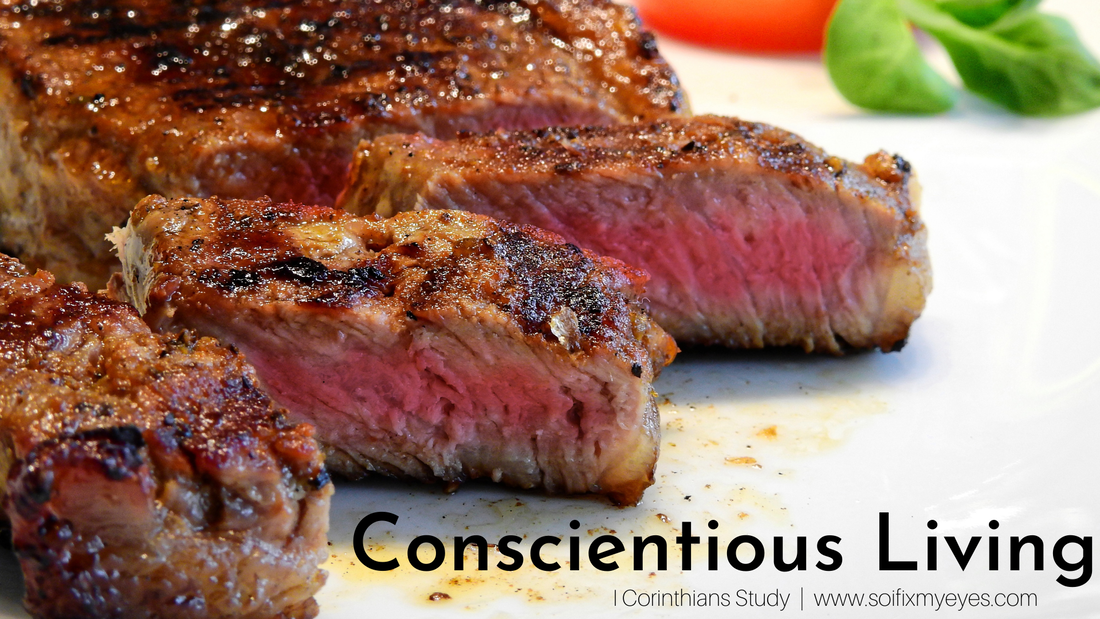Conscientious Living9/15/2021 After speaking on the issue of idolatry, Paul circles back around to a prevalent cultural clash for the Corinthians: food sacrificed to idols. In chapter eight, Paul talked about it in the context of a believer visiting and partaking of meat sacrificed to idols within pagan temples. While Paul said that this in and of itself was not sin, causing another brother or sister in Christ to stumble because of the action and the context in which it was conducted is sin. Therefore, believers should abstain from eating meat within the temple for the sake of others. It’s part of surrendering our rights out of love for others. Now, after addressing the importance of living uprightly in a morally decaying culture and giving a strong warning against idolatry, Paul circles back around to the topic of meat sacrificed to idols but in a completely different context. As we mentioned back when we were looking at chapter eight, food sacrificed to idols may not have any cultural significance or relevance to us, but the life application and truths taught on this topic apply and are relevant to many areas of life in the 21st century. Therefore, let’s dive into this last section of 1 Corinthians 10 and see what we can learn from Paul’s instructions to the Corinthians. “Let no one seek his own good, but the good of his neighbor. Eat whatever is sold in the meat market without raising any question on the ground of conscience. For ‘the earth is the Lord’s, and the fullness thereof.’ If one of the unbelievers invites you to dinner and you are disposed to go, eat whatever is set before you without raising any question on the ground of conscience. But if someone says to you, ‘This has been offered in sacrifice,’ then do not eat it, for the sake of the one who informed you, and for the sake of conscience—I do not mean your conscience, but his.” ~1 Corinthians 10:24-29a The overarching motivation behind the decisions we make in our conduct with and towards others should be love. Paul starts his exhortation with a reminder to always think of others first. As Christians we have liberties and rights that we could exercise. However, out of love and consideration towards others we must live conscientiously, keeping in mind what would be best and most edifying to others and, therefore, most gospel spreading. So in regard to eating meat sacrificed to idols within one’s private life, Paul tells the Corinthians that they have freedom to eat meat sacrificed to idols because in and of itself it is not evil or bad. Therefore, when out and about doing life with unbelievers, the Corinthian believers could feel comfortable eating the food set before them if nothing is mentioned about where the meat came from. However, if the topic of origin comes up, Paul encourages the Corinthians to refrain from partaking on the grounds of conscience. Unbelievers are always watching and observing how Christians react and live their lives. They can quickly detect duplicity and hypocrisy. Therefore, it is crucial that Christians live their lives in complete alignment with their beliefs. Not only is this something God requires and expects of His redeemed children, but it is the only way to be a city on the hill, the salt of the earth, and the fragrance of Christ to in a dark and dead world. This is why Paul told the Corinthians to abstain from eating meat while dining at an unbeliever’s home and they mention that the meat had been offered to idols. This fact in and of itself would not affect the believer, however, for the sake of the unbelievers, the Christian should abstain for the sake of the other’s conscience. But why should the Corinthians do this? Why should our actions and conduct be so dictated by others? Is that liberty? Paul answers these questions in the last part of 1 Corinthians 10. “I do not mean your conscience, but his. For why should my liberty be determined by someone else’s conscience? If I partake with thankfulness, why am I denounced because of that for which I give thanks? So, whether you eat or drink, or whatever you do, do all to the glory of God. Give no offense to Jews or to Greeks or to the church of God, just as I try to please everyone in everything I do, not seeking my own advantage, but that of many, that they may be saved.” ~1 Corinthians 10:29-33 Paul encourages us to live conscientiously for God’s glory. By surrendering our rights and considering others first, we give no offense to believers or unbelievers and thereby glorify God. At the end of the day, it’s not about whether one eats or not, but the heart attitude. Are we thinking of others first? Are we pursuing God’s glory in our actions first and foremost? Are we doing all within our power to give no offense to those we interact with day to day?
While we may not have to deal with food sacrificed to idols and whether or not we should partake, there are a myriad of other areas that this concept applies to. Alcohol consumption, mask wearing, and media choices are just a few areas that we can apply this concept towards. Our choices and actions matter. People are watching what we say and do and looking to see how those two align. Therefore, let us remember Paul’s timely reminder that no matter what we do, we must do it all to the glory of God that the church may be edified and the lost saved.
0 Comments
Your comment will be posted after it is approved.
Leave a Reply. |
Kristin RenferView the About page for more info on the author. Receive Posts via EmailArchives
November 2022
Categories
All
�
|


 RSS Feed
RSS Feed